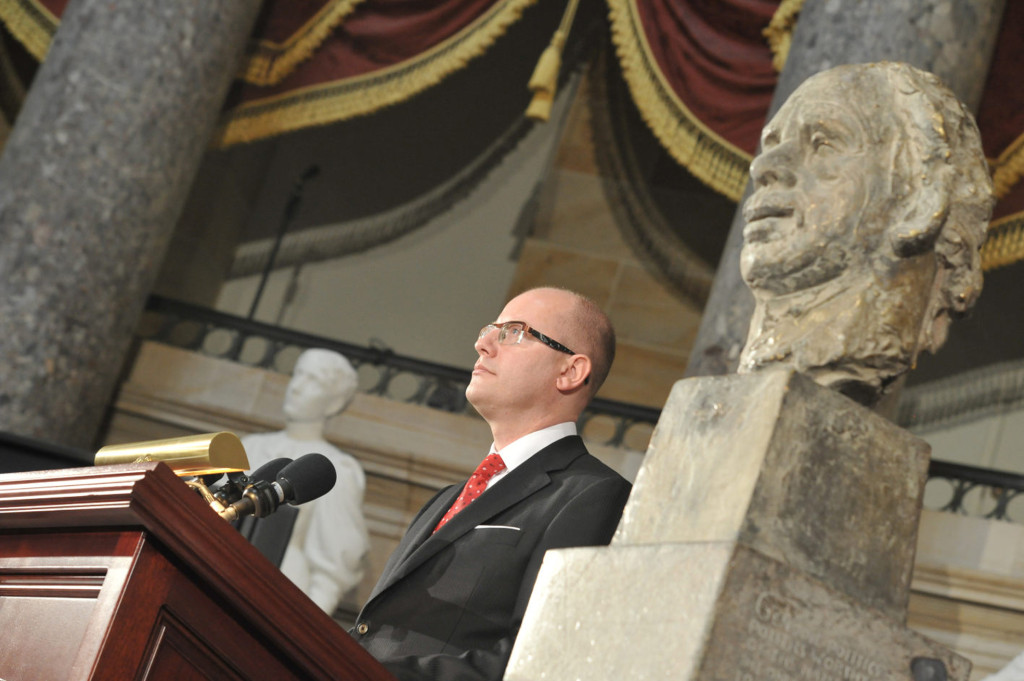The legend of Havel seems far behind us and Prime Minister Sobotka is not being welcomed by Obama. Pro-Russian statements from Zeman annoy their faithful US allies
Relations between the Czech Republic and the United States have entered into an era of uncertainty, abandoning the idyllic romantic road linked also to the iconic figure of Václav Havel, to venture into a more complex and tortuous rut that gave its first fruits, difficult to digest, during the Czech Prime Minister Bohuslav Sobotka’s visit to Washington.
The prime minister was the first head of the Czech government not to be received by the US president in office, in this case Barack Obama, a more than concrete sign of the chilling in the relations. A gesture with reasons linked to various events and statements in recent months, from the pro-Russian position of the Czech President Miloš Zeman on the Ukrainian situation, to the weak defense of human rights in Prague, to the request of the United States to spend more in the defense sector.
It was Joe Biden, who met Sobotka instead of Obama, who once again asked for the Czech defense expenditure to be increased, without receiving an affirmative answer. In the conversation between the two, a significant impact came from the statement of the Czech prime minister last June, in which Sobotka said that Prague would never have requested nor needed the US military presence in its territory.
In addition, Washington did not appreciate the statements made by Hradčany’s new tenant on the Ukrainian crisis either. Zeman, in fluent Russian, criticized the Western sanctions against Russia, stressing that in Ukraine a civil war is underway. “In this situation any economic support to Kiev only means throwing away money. Ukrainians must first solve their internal problems”. The new US ambassador in Prague, Andrew Schapiro, has been pretty clear about the issue since taking office: “Certain things that say the Czech leaders on the Ukrainian crisis create a sense of confusion and concern in the United States. When listening to various members of the Czech administration we cannot understand what the real position of Prague is” on international politics.
One must therefore ask whether and how much the visit of Sobotka in Washington was also intended to restore the right degree of friendliness between the two countries and fix certain statements made where necessary. The US discontent, in addition to foreign-and defense policy, refer also to the energy, economic and human rights sectors. The US in particular, is unsatisfied with Prague’s decision to terminate the tender for the expansion of the Temelín nuclear plant, in which the Westinghouse was one of the contenders.
At the centre of the American criticism, moreover, is one of the flagships of their dearest Havel. It was indeed Havel, to whom a bust at Capitol Hill has just been entitled, and who created a program to support democracies in post-dictatorship transition, which is currently being dismantling. The former Czech president, and leader of the Velvet Revolution of which reaches its 25th anniversary, has become the fourth leading figure internationally to receive this honor after Winston Churchill, Lajos Kossuth and Raoul Wallenberg. A simulacrum of the close relations between the two countries that is becoming even more impressive and hard to ignore right now.
The relationship that existed between Prague and the United States at the time of Havel seems worn out and the words of the Czech intellectual and politician seem even more distant, from the time when three months after the revolution he declared, before the US Congress, the debt of Czech gratitude towards Washington for defending democracy in Europe in three wars, two world wars and the cold war. Havel had repeatedly condemned the policies that put economic interests above human rights, as, he said “occurs in Russia and China”. It was precisely in China where the current president Zeman, on the other hand, wanted to emphasize he visited “not to give lessons in human rights, but to learn how to establish a society and how it manages to increase economic development”.
In addition to the openly pro-Moscow statements from Zeman, other examples further irritate the United States such as the recent official visit by a Czech member of Parliament, the vice president of the Chamber Vojtěch Filip (head of the communist KSČM) in Moscow, authorized by the president of the lower house, the Social Democrat Jan Hamáček. Also the pro-Russia feelings make their way in the Czech Republic and this is being frowned upon by the United States: the local organization of the Communist Party of Frýdek-Místek, one of the most numerous and active in the Czech Republic, has joined an anti US petition for the eurosceptic far-right of “Ne Brusel – Národní demokracie”. The accusation made towards the US is that of meddling in the Czech politics, as shown by the protests of 17 November and the alleged attempts by Washington to crack down on pro-Russian feelings in the Czech Republic. During one of the Velvet Revolution celebrations Zeman was the victim of egg throwing by demonstrators with slogans “We do not want to become a Russian colony”. A country divided between ideals of the past and present occasions, including commitments of European and foreign policy and economic interests. Divisions that Washington view with concern and skepticism.
by Daniela Mogavero




